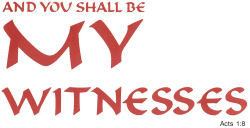

 Vol. 2, No. 2, April, 1997
The Challenge Before Us, Part 2
Vol. 2, No. 2, April, 1997
The Challenge Before Us, Part 2by Sr. Angeline Bukowiecki, S.N.C.
 What I would like to share with you this month is my personal experience of the challenge that lies before us.
What follows are the honest observations of my own experience concerning the challenge that lies before us in establishing training in evangelization in parishes in the U.S. These observations are the result of working closely with the laity in the development and formation of community since 1971, and more recently, the past 21 years of experience in evangelization in pastoral care in hospitals, home visitations, and sharing with pastors, parish staff, and parish councils in Illinois, Colorado, North Dakota, Arizona, Kansas, Louisianna, and Pennsylvania.
The hub of Catholic Christianity in the U.S. is the parish. Therefore, if the Church is going to impact the culture, it must do so through its parishes by preparing its parishioners well. We cannot depend on Catholic schools, colleges, or universities to do this for us because their catholicity is often questionable. Training in evangelization needs to be brought into parishes where every parishioner can be trained to take the Gospel into the marketplace and be a leaven for Christ in society. What keeps this from happening in the U.S.?
From the statistics we have just looked at, The Challenge Before Us, Part 1, we can see that the culture has much to do with it. The culture has been more effective in "evangelizing" the Church than the Church the "culture." The Church has not been able, so far, to effectively address rampant materialism, complacency, and inertia, the three major obstacles to evangelization and genuine discipleship in Anglo-American society.
The majority of bishops are not promoting or encouraging evangelization among their priests, deacons, religious, and laity. If the priest, the pastor, is not directly behind the effort of evangelization, supporting those who are doing it and helping the parish put its focus on evangelization, then it doesn't go very far.
There is a reluctance on the part of many dioceses and parishes to give the needed time, energy, and money for evangelization. The priests and their parishioners do not understand what evangelization means. Many believe they are already evangelizing because they say that everything they do is evangelization. For others, their understanding is that of the Pentecostal T.V. evangelist and they want no part of it.
The number one problem is getting people to own the mission of evangelization, realize its need, and then want to be trained in evangelization. Pastors do not have a planned effort, a strategy of how to prepare their parishioners to own the mission of evangelization.
Many pastors see the R.C.I.A., the Rite of Christian Initiation of Adults, as the parish's evangelization effort. For many parishes, this effort is concrned for the most part with "seekers" who come on their own initiative to the parish door, wanting to become Catholic. There is little effort, if any, to: Go! Seek out persons for Jesus and bring them into the Church.
Most parishes are maintenance parishes and, therefore, most pastors are maintenance pastors, maintaining what is, and having a hard time doing that:
What I would like to share with you this month is my personal experience of the challenge that lies before us.
What follows are the honest observations of my own experience concerning the challenge that lies before us in establishing training in evangelization in parishes in the U.S. These observations are the result of working closely with the laity in the development and formation of community since 1971, and more recently, the past 21 years of experience in evangelization in pastoral care in hospitals, home visitations, and sharing with pastors, parish staff, and parish councils in Illinois, Colorado, North Dakota, Arizona, Kansas, Louisianna, and Pennsylvania.
The hub of Catholic Christianity in the U.S. is the parish. Therefore, if the Church is going to impact the culture, it must do so through its parishes by preparing its parishioners well. We cannot depend on Catholic schools, colleges, or universities to do this for us because their catholicity is often questionable. Training in evangelization needs to be brought into parishes where every parishioner can be trained to take the Gospel into the marketplace and be a leaven for Christ in society. What keeps this from happening in the U.S.?
From the statistics we have just looked at, The Challenge Before Us, Part 1, we can see that the culture has much to do with it. The culture has been more effective in "evangelizing" the Church than the Church the "culture." The Church has not been able, so far, to effectively address rampant materialism, complacency, and inertia, the three major obstacles to evangelization and genuine discipleship in Anglo-American society.
The majority of bishops are not promoting or encouraging evangelization among their priests, deacons, religious, and laity. If the priest, the pastor, is not directly behind the effort of evangelization, supporting those who are doing it and helping the parish put its focus on evangelization, then it doesn't go very far.
There is a reluctance on the part of many dioceses and parishes to give the needed time, energy, and money for evangelization. The priests and their parishioners do not understand what evangelization means. Many believe they are already evangelizing because they say that everything they do is evangelization. For others, their understanding is that of the Pentecostal T.V. evangelist and they want no part of it.
The number one problem is getting people to own the mission of evangelization, realize its need, and then want to be trained in evangelization. Pastors do not have a planned effort, a strategy of how to prepare their parishioners to own the mission of evangelization.
Many pastors see the R.C.I.A., the Rite of Christian Initiation of Adults, as the parish's evangelization effort. For many parishes, this effort is concrned for the most part with "seekers" who come on their own initiative to the parish door, wanting to become Catholic. There is little effort, if any, to: Go! Seek out persons for Jesus and bring them into the Church.
Most parishes are maintenance parishes and, therefore, most pastors are maintenance pastors, maintaining what is, and having a hard time doing that:
- Sacramental preparation of their young people;
- Sacrament of Reconciliation;
- Providing some adult education in the faith; and
- Doing marriages and burials.
- The pastor is ready but the people are not.
- The pastor is ready and the people are ready and the pastor is changed. The new pastor isn't ready and so the present readiness of the people falls by the wayside. Or, it has happened that the new pastor gives a token "go ahead" for the evangelization effort.
- themselves and their families;
- activities with friends;
- sports and recreational activities;
- the extracurricular activities of their children at school;
- their work schedules which won't permit them the time;
- ongoing education required by their job; or
- other civic/political involvements.